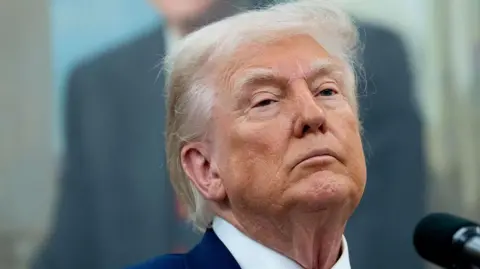In a significant development for the UK, the exemption from the recently increased US tariffs on imported steel, which saw rates leap from 25% to an alarming 50%, brings a wave of relief. This decision, articulated in President Donald Trump’s latest executive order, was not a guaranteed outcome despite the UK previously negotiating a crucial agreement on 8 May. This agreement aimed to completely eliminate tariffs on certain metals, although it has yet to be officially enacted. Discussions leading up to the announcement revealed that UK trade officials and leaders within the steel industry were bracing for the worst — operating under the assumption that the country would face the same steep tariffs as its global counterparts until the deal was finalized.
The atmosphere surrounding the announcement from President Trump was charged with relief among UK trade officials, who were anxious about the potential repercussions had the exemption not been granted. The uncertainty surrounding the imposition of tariffs had created an anxious waiting period for many, leaving them unsure when they would receive the concrete benefits of the existing trade negotiations. The importance of this exemption cannot be understated; it serves as a crucial lifeline for UK steel producers who are pivotal to the industry’s continued viability and competitiveness in the global market.
However, the clock is now ticking, along with the pressures that accompany it. A stipulation in Trump’s executive order dictates that if the trade agreement is not formally finalized by 9 July, then the UK’s tariff rate on steel will revert to the 50% threshold. This uncertainty presents a significant challenge for businesses both in the US and the UK, as they wrestle with the impending deadline that could greatly affect operations, investments, and pricing strategies in the coming weeks. Anecdotal evidence points to a hesitance among traders and businesses, which could have longer-term corrosive effects on industry stability as uncertainty looms.
While officials from both governments, including UK Business Secretary Jonathan Reynolds and US Trade Representative Jameson Grier, have expressed a commitment to expedite the agreement process, concerns are bubbling to the surface regarding the broader implications of the tariff situation. A valid worry exists that steel shipments intended for the US may be redirected toward the UK market, leading to potential market imbalances and increased competition that could undercut domestic producers.
Moreover, the UK made concessions of its own as part of the tariff agreement, including tariff cuts on specific US agricultural products such as beef and ethanol—a renewable fuel derived from crops. This decision is already provoking concerns in the UK ethanol market, especially among wheat farmers who rely on this sector as a major revenue stream. Observers highlight the potential for these internal concessions to be interpreted by US trade officials as a lack of commitment to the bilateral agreement, jeopardizing the overall trade relationship.
The situation is a stark reminder that international trade agreements are often far more complex than they appear at first glance, with potential ripple effects that can lead to unexpected consequences. As the time frame draws closer to the pivotal deadline of 9 July, both countries must navigate these intricate challenges and ensure that the mutual benefits promised by the tariff exemption are realized for their respective industries.



